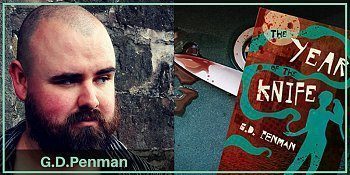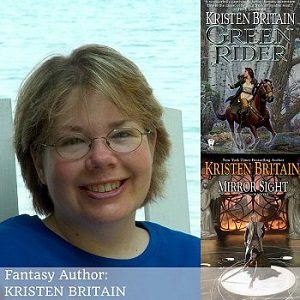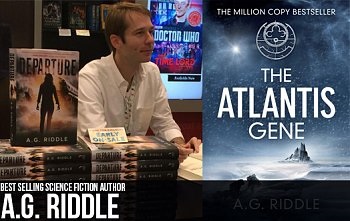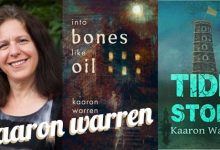Interview with fantasy and crime fiction author, Graham Edwards
For December’s featured guest interview, the Media Team had the opportunity to chat with graphic designer, animator, and writer Graham Edwards. Along with writing fantasy and crime fiction, he is also a senior staff writer for Cinefex, the magazine dedicated to visual effects in film.
Intrigued yet? Take a look at our awesome interview with Graham below!
am_hammy asks: When did you begin your journey of writing?
When I was, oh, maybe five or six years old, I decided I was going to play at being a paper boy. It obviously hadn’t occurred to me that being a fighter pilot might be more exciting. The trouble was, I didn’t have anything to deliver. So I made a comic. I don’t remember much about its contents, other than it was a rip-off of The Beano or one of the other kid’s comics I used to read at the time. I got so wrapped up with writing and drawing the damn thing that, by the time it was done, there was no daylight left to deliver it in. It didn’t matter. By then I’d worked out that telling stories was a whole lot more fun than delivering papers. Maybe better than being a fighter pilot, too.
Which do you prefer: graphic designer, animator, or writer?
I’ve been lucky enough to work on some amazing projects in all three roles. But writing is the true thread that runs through everything – the one thing I can’t ever imagine letting go.
Where did the pseudonym Nick Curtis come from and why?
I didn’t write the Nick Curtis books alone. The storylines were devised by a creative editorial team, and I took on the role of ghostwriter to do the heavy lifting. With that kind of collaborative project, it often makes sense to use a pseudonym … and that’s how Nick was born.
How much has Richard Adams influenced you?
Richard Adams’s novel Watership Down had a big impact on me when I read it as a boy. I also enjoyed his novelsShardik and The Plague Dogs, although they didn’t get under my skin in the same way as that story about the rabbits. I haven’t re-read any of Adams’s books as an adult, but I think that something of his strange blend of spiritual wonder and raw physicality has stayed with me.
While I often cite Adams when talking about my dragon novels, I have to confess that’s partly out of convenience. My elevator pitch for my first novel, Dragoncharm, was: “It’s Watership Down with dragons.” It’s not a bad pitch – clear and concise. In terms of writing style, however, Dragoncharm was more heavily influenced by William Horwood’sDuncton Wood. Horwood’s epic saga about moles is big-hearted, and deeply connected with the ancient history and mythology of England and Wales, and spoke to me more profoundly than anything Adams wrote. But then, arguably, without Watership Down there would be no Duncton Wood.
You have anthropomorphized dragons, the most mystical of beasts; how did you set about this task?
Weirdly, I don’t think I did. Most of the time, I forgot they were dragons and just wrote them as characters. Ultimately, the dragon stories aren’t about wings and fire, scales and claws, but about love and betrayal, despair and hope. They’re just like you and me, really.
That said, I did put in a lot of hours wrestling with the vocabulary. For example, how do dragons measure distance, or temperature, or time? You can’t use miles or metres, and while you can get away with days and years, weeks and months are entirely human conceits.
Metaphors and similes are a big challenges, also. When a dragon thinks that something is “as sharp as –” … well, as sharp as what? Not a knife or a razor, that’s for sure – my dragons would have no concept of such things. “As sharp as ice” was one of my solutions. Anyone who’s serious about writing a non-human character has to tackle this issue sooner or later. If you use the language well, that goes a long way to convincing your readers that they really are inside the mind of an alien being.
With regard to the Stone or Amara Trilogy, how did the Krakatoa influence come about?
I knew that my main character, Victorian explorer Jonah Lightfoot, was going to be a student of Charles Darwin. I also knew that I needed an interesting way to transport him from our world to the strange wall-world of Stone. While researching late nineteenth-century history, I stumbled over some amazing eye-witness accounts of the eruption of Krakatoa in 1883, and everything fell into place. It was one of the biggest explosions in recorded human history, for goodness sake. If that can’t open a portal between the worlds, what can?
Bruno Spatola asks: Do you share the opinion that the fantasy genre has become homogeneous, or do you see it as an infinitely large umbrella to cast your ideas under?
There’s a lot of fantasy fiction out there that is homogenised, to be sure, and which conforms to certain stereotypes. Frankly, however, I find genre definitions tiresome. For me, the best fiction is that which defies categorisation. Does Stephen King write fantasy, or horror, or just damn good stories? Is David Mitchell a literary author who wishes he was a fantasist, or are Cloud Atlas and The Bone Clocks simply astonishing works of art? In fiction – fantasy or otherwise – all things are possible. Why stay under any kind of umbrella? I’d rather feel the rain.
Why do you think readers connect and relate to this style of writing?
Fantasy fiction is often seen as escapism – a way to travel outside the mundane. But it’s also rooted deep in the history of storytelling. It’s a pretty good bet that the earliest campfire stories told by our primitive ancestors were tales about shapeshifting animals and magic in the woods (not that such tales would necessarily have been regarded as “fantasy” by an animist audience). It’s also true that speculative fiction – in all its forms – takes storytelling to the outer limits. Philip K. Dick once remarked that, while all writers pose the question, “What if?”, the question posed by most science fiction writers is, “My God!!! What if?!!!” Now, that’s a question I want to know the answer to!
Bruno Spatola asks: How much does an audience shape what you write?
As far as my fiction is concerned, it doesn’t. Not one bit. The reason I write is because I can’t stop the words coming out. If people like the result, that’s a blessing. As for factual articles, well, I do write those with my audience in mind. That’s the job, but it’s also okay by me, because I’m a member of that audience too. Either way, it amounts to the same thing: I always try to write something I’d want to read myself.
Bruno Spatola asks: Do you feel a lot of great writers are hindered from publishing their magnum opuses due to the hunger of a certain style readers crave, or has self-publishing restored the possibility of unlikely bestsellers?
William Goldman wrote a great book about screenwriting called Adventures in the Screen Trade. In it, he made the observation that, in Hollywood, “nobody knows anything” – meaning, nobody really knows what makes a hit movie. Well, surprise! The same is true of publishing! Really, every bestseller is unlikely. Why? Because nobody knows anything.
Ever since there have been bookshops, shelves have been filled with novels that publishers thought would be sure-fire successes, but which nobody wanted to read. Conversely, eager readers have turned countless apparent no-hopers into runaway bestsellers. Self-publishing has empowered authors to a degree, but it’s also flooded the market with too much bad material that should never have seen the light of day. The signal-to-noise ratio has increased exponentially, so it’s harder than ever to find the good stuff.
Fortunately, as a writer, I don’t care about any of that. The act of writing should have nothing to do with markets or bestseller lists. Those are just publishing (and self-publishing) conveniences. To write well, you have to focus on the things that matter. The words. The story. Whatever’s bubbling away in your head and heart. Let go of the outcome. Que sera, sera.
Arthur G. Mustard asks: It’s been twenty years since the release of Dragoncharm. How do you stay at the top for so long and how do you see the next two decades going?
Twenty years? Jeez! Well, in all that time I’m not sure I’ve got much further than base camp, let alone reached the top. There’s a lot of mountain still to climb. Actually, to mix my metaphors, the past twenty years have been something of a roller coaster. For every moment of exultation I’ve enjoyed at getting something published, I’ve also endured a corresponding plunge into despair as yet another project has bitten the dust. It’s not about “staying at the top” (wherever that is), but rather keeping the faith.
As for the next two decades, I fully expect my knuckles to remain as white as they have been since I first climbed aboard this insane ride back in 1995.
Arthur G. Mustard asks: The British Fantasy Society nominated* Dragoncharm the best novel of the year; what were your thoughts as this was your debut?
It was a huge thrill to get the recognition, especially since it was my first outing as a published author. Nobody believes you when you say it’s an honour just to be nominated, but in my case that really was true.
What led you to switch to crime novels in 2008?
Remember that roller coaster I mentioned? By the time 2008 came round, with six novels under my belt, I found myself stuck in a loop at the bottom of one of the deepest, darkest plunges of the track. I was still getting a few short stories published, but when it came to full-length fiction the rejections were stacking up. My agent – sensing, I think, that I needed something to drive me out of the doldrums – casually suggested ghostwriting, something I’d never done before. The genre was crime, also new to me. I was terrified, but dived in anyway – fear is the best reason to do something, right? I’m now working on my eighth novel as a ghostwriter, a role that’s become an integral part of my writing life.
am_hammy asks: How do you prepare yourself for switching from writing fantasy to horror to crime?
As you may have gathered, I don’t have much truck with genre definitions. It’s all just storytelling. Granted, every genre has certain tropes which can be more or less helpful, but I try not to think about such things too hard. Stick too closely to the conventions and you’ll write something, well, conventional. Who wants that? Believe it or not, when I was writing my dragon books, I never thought of them as fantasies at all. I still don’t. Read them closely and you’ll see that they’re not set in a make-believe world. They’re set in our world. I just tweaked history slightly in order to give those great big fire-breathers the room they needed to fly.
Bruno Spatola asks: Which one of your works would you most like to see turned into a movie, and who would be your dream director to helm it?
It would be fun to see the vertiginous world-wall of Stone & Sky on a movie screen. But the book that would adapt most successfully is probably Dragoncharm (it’s been optioned a couple of times, so it’s come close in the past). As for the director, who better than George Miller? Combine his experience with talking animals and animated features (Babe, Happy Feet) with his penchant for stunningly choreographed, visceral action (Mad Max: Fury Road) and you’ve got something close to the Dragoncharm movie that plays occasionally in my head.
Arthur G. Mustard asks: James Cameron says “Cinefex is the one true source. Read it to expand your vision.” Do you feel this rings true for you? Why?
Of course it rings true – I work for Cinefex! But seriously, it’s something I’ve believed ever since I started reading the magazine back in 1980, when I never dreamed I might one day be a part of the Cinefex team.
Here’s what’s special about Cinefex. Every issue, you get a fresh batch of long, painstakingly-researched articles on the making of the latest motion pictures, based on first-hand interviews with the key professionals responsible for the visual and special effects. But here’s the bonus – each issue is also the next link in an unbroken documentary chain stretching back over 35 years. Stack up all those back issues, and what you have is a single, ever-expanding history of visual effects. That’s around 50 million words of rigorous research journalism. And counting.
Bruno Spatola asks: Do you feel that your role on the legendary Cinefex magazine feeds into your creativity as a writer of fiction; does that knowledge of film and wealth of imagery to draw from inflame your imagination, or is your ‘writer mode’ totally separate from that perspective?
I’ve been inspired by movies ever since I was a kid, and, yes, my fiction writing reflects that. When I’m writing action, for example, I might “see” a cinematic sequence playing out on the IMAX screen in my head. But writing is also about discipline and hard labour, lifting up those words one by one and trying to heave them into place (words are damned heavy, right?). It’s about crafting the language. That’s as true for the non-fiction as it is for the make-believe. As for the idea of a separate “writer mode” – that’s not something I subscribe too. It all exists together in the zone, where inspiration and perspiration fuse into something, well, sweaty and inspired.
Bruno Spatola asks: What is your favourite issue of Cinefex and why? Issue #9 (Blade Runner) is my champion.
The Blade Runner issue is a stand-out, for sure. Issue 38, featuring The Abyss, is terrific too – boy, was that a tough movie to make. Any issue covering a Christopher Nolan film gets my vote. Oh, and am I allowed to mention issue 136? Not only does it contain Joe Fordham’s terrific article on Gravity, but also my own piece on Rush – my first appearance in the magazine.
Tkent asks: Your blogging covers a wide range of topics, from blockbuster films to Fortune, your hero dragon. What do you think makes a good blog and what works for you?
Honesty.
How does blogging, staying active on social media, and writing fit in to your daily routine?
The day job comes first, because that’s what pays the bills. Luckily for me, I do a lot of writing in my day job! Writing fiction comes next. I mostly squeeze that into whatever corners of the day I can find – early mornings often work well for me. All the rest of it plays third fiddle, which is why I’ll often go weeks without sticking my head above the online parapet, then fire off a flurry of tweets or blog posts all in one go.
Do you feel that blogging and social media are beneficial for writers today? Why?
Yes. Social media, including blogging, is a great way for writers to make contact with readers – and vice versa. It’s also a wonderful way to promote your work. But you have to know when to stop. Writing about writing is not the same as writing.
Bruno Spatola asks: If you could cherry-pick any author you’re a fan of to read your work right now (simply out of curiosity or for some pointers), who would it be?
I’d present my work to a panel comprising John Irving, Neal Stephenson and Stephen King. Then I’d probably run away.
Where can we go to find out more about you and your works?
You can visit my website at http://graham-edwards.com – you’ll find lots of information about my novels and short stories, plus a few bits of free fiction and artwork. It’s also where I blog about writing, reading and, well, whatever takes my fancy.
I also hang out at http://cinefex.com – check out Cinefex magazine for in-depth articles on major motion pictures, and read the Cinefex blog for regular stories about movie magic of the past, present and future.
If there is one piece of advice you could give to our readers, what would it be?
Write until your fingers bleed, then write some more.









